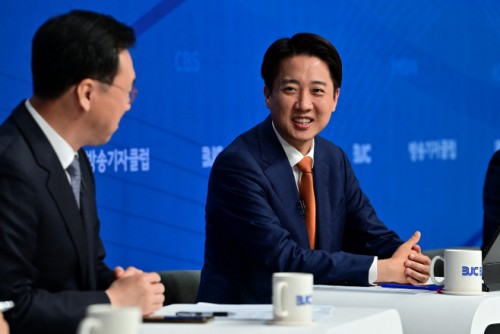 |
| Lee Jun-seok, presidential candidate of the New Reform Party, attends a debate hosted by the Korea Broadcast Journalists Club at the Korea Broadcasting Hall in Yangcheon District, Seoul, on May 26. / Source: Yonhap News |
Lee Jun-seok, presidential candidate of the New Reform Party, declared on May 26 that there is “zero percent” chance of unifying his candidacy with that of Kim Moon-soo from the ruling People Power Party (PPP), reiterating his commitment to stay in the presidential race until the end.
Speaking during a debate hosted by the Korea Broadcast Journalists Club in Yangcheon District, Seoul, Lee addressed mounting pressure from conservatives for him to step aside. “Lately, I’ve heard threats like, ‘If you don’t unify, it’ll be your fault we lose,’ or ‘You’ll be buried in politics,’” he said. “This is a structure where the establishment has already decided the outcome and labels anyone who doesn’t conform as a traitor—rude and disposable. That’s precisely the oppressive, outdated culture we resisted and left behind when we founded a new party.”
Lee rejected the notion of political engineering through unification, saying, “I believe elections should be about policies, pledges, and visions for how to lead the country—not political deals.”
Reflecting on the mood at his recent campaign events, Lee noted, “I’m sensing a shift. Voters are starting to realize that a completely different political force is emerging. That’s why the two major parties are now suddenly reacting with such alarm to me and the New Reform Party.”
During the debate's Q&A session, Lee further criticized the PPP, stating, “In the People Power Party, the hardworking bear performs while the old elite reap the benefits. That’s why I won’t take part in their so-called unification push.” He also condemned the notion of seeking power despite a past tied to martial law. “How can someone who once declared martial law still aim to govern? That’s incomprehensible.”
When asked if he would consider stepping aside for Kim Moon-soo in a unity deal, Lee responded firmly: “Zero percent. If they’re truly concerned about this country, they should be persuading Kim Moon-soo to withdraw. That would be the only realistic way to stop Lee Jae-myung from winning. If Kim steps aside, and the race becomes a simple contest between me and Lee Jae-myung, the odds would shift dramatically.”
Lee also took aim at candidates who refuse to participate in public debates. “The more opportunities there are to vet candidates, the better,” he said. “If someone avoids debates, they’re effectively guilty.”
Earlier the same day, Lee reaffirmed his resolve in a message sent to the party’s 110,000 members via text and email. In the message, he wrote, “A certain party continues to demand that we unify. But a party responsible for martial law and impeachment shouldn’t even have fielded a candidate in this race.” He condemned what he described as hypocritical threats, adding, “They never listened to our decision, and now they say everything will be our fault. They’re even warning that we’ll be politically buried.”
“They’ve always operated this way,” he continued. “They ignore others’ will, push their delusions, and threaten to destroy anyone who doesn’t obey. It’s the same kind of pressure young people face across society. That’s why we will walk our path with even greater determination.”
Lee’s comments draw a sharp line between himself and the PPP’s campaign, firmly rejecting any unification scenario and signaling his intent to position the New Reform Party as a lasting force in Korean politics.
Most Read
-
1
-
2
-
3
-
4
-
5
-
6
-
7





















